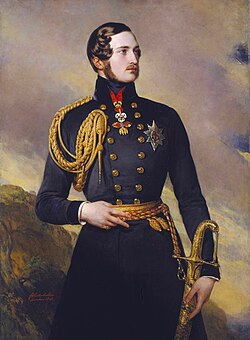 | |
| Pronunciation | English: /ˈælbərt/ ⓘ AL-bərt French: [albɛʁ] ⓘ German: [ˈalbɛʁt] ⓘ Danish: [ˈælˀpɐt] |
|---|---|
| Gender | Male |
| Language | Germanic |
| Name day | November 15 |
| Origin | |
| Meaning | Noble and bright |
| Other names | |
| Related names | Al (nickname), Ab, Abert, Bert (also short for Robert), Adalbert, Adalberto, Albertson, Adelbert, Delbert, Adbert, Elbert, Alberto, Albrecht, Alprecht, Alpert |
Albert is a masculine given name. It is derived from the Germanic Adalbert and Adelbert, containing the words adal ("noble") and beraht ("bright", compare Robert). It is also less commonly used as a surname. [2] [1] Feminine forms of the name, such as "Alberta" are relatively uncommon and are declining in use.